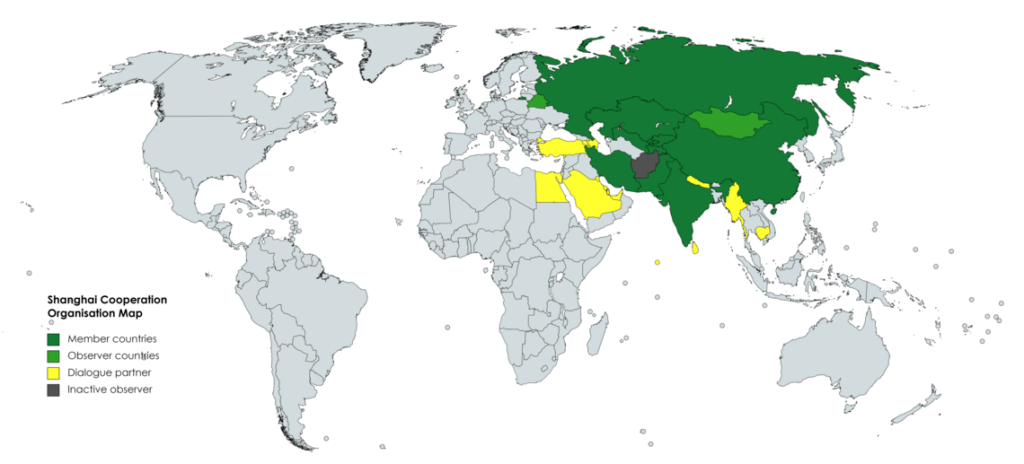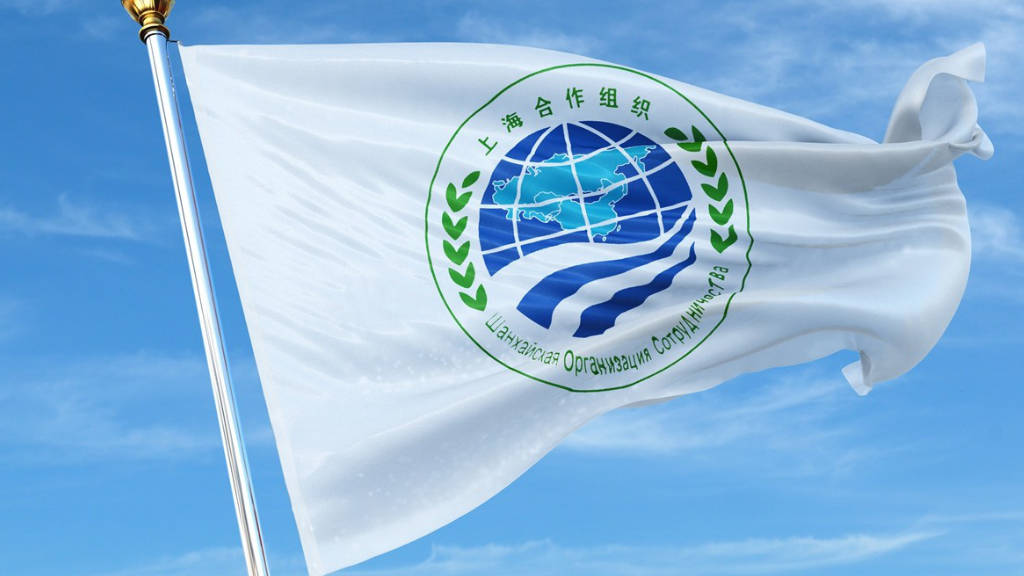Putin, Xi, Modi and other regional leaders are all attending
The annual Heads of State meetings of the member countries of the Shanghai Cooperation Organisation (SCO) has begun in Astana, Kazakhstan. The SCO has different categories of membership, with full members being China, India, Iran, Kazakhstan, Kyrgyzstan, Pakistan, Russia Tajikistan and Uzbekistan. Three countries — Afghanistan, Belarus, and Mongolia — have an observer status with the SCO, and a further fourteen — Azerbaijan, Armenia, Bahrain, Cambodia, Egypt, Kuwait, Maldives, Myanmar, Nepal, Qatar, Saudi Arabia, Sri Lanka, Türkiye and UAE have dialogue partner status.
Permanent Guest Attendees include the Heads of the United Nations, the Commonwealth of Independent States (CIS) the ASEAN bloc, (Brunei, Cambodia, Indonesia, Laos, Malaysia, Myanmar, Philippines, Singapore, Thailand, and Vietnam), and Turkmenistan.
Several countries have applied to join the SCO, including Algeria, Bangladesh, East Timor, Iraq, Israel, Laos and Syria. The United States applied to join in 2015 but was refused.

Mandate
The SCO was formed on the basis of the Shanghai Five, a forum of a group of countries concerned about the threat of terrorism, the disruption of border security, the rise of Islamic fundamentalism and the spread of its doctrines from the main flashpoint, Afghanistan. The situation in Afghanistan continued to deteriorate, culminating in the invasion of the country by U.S. troops in 2001. On June 15, 2001, the Shanghai Five was transformed into a full-fledged multidisciplinary cooperation organization, the Shanghai Cooperation Organization, as the status of the forum did not provide for decisive and large-scale actions to eliminate the threat of terrorism.
Subsequently, the SCO demonstrated its ability to cooperate on regional military and security issues, advancing common goals in the event of a final U.S. troop withdrawal, which occurred in 2021.
As it evolved, the SCO gradually transformed into a multilayered organization, focusing not only on counterterrorism but also on countering drug trafficking, then concentrating on regional connectivity, infrastructure, trade, and social development
It has subsequently morphed into a multi-layered organisation, still with a strong regional security aspect but also as concerns regional connectivity, infrastructure and social development as well as trade. The SCO describes its own goals as follows:
- To strengthen mutual trust, friendship and good neighbourliness between Members;
- To encourage the effective cooperation between Members in politics, trade, economy, science and technology, culture, education, energy, transport, tourism, and environmental protection;
- To jointly ensure and maintain peace, security and stability in the region; and
- To promote a new democratic, fair and rational international political and economic international order.
The SCO also acts as a regional sounding board for members who have historical common problems – such as India and Pakistan, both of whom joined in 2017.
Associated Bilateral Meetings
The annual meetings also act as a common platform for a host of additional regional meetings that take place around the same time, such as the East Asia Summit, which took place in Jakarta. Russia also attends these sessions as part of the ASEAN-Russia sub-committee. Other regional meetings also revolve around the main SCO event, including in Russia’s case, President Putin having direct meetings with the leaders of China, Kazakhstan, Azerbaijan, Mongolia, Turkiye, and Pakistan. Russia’s foreign policy aide Yury Ushakov said that Putin’s program “includes a range of very important bilateral contacts” as Moscow considers the summit to be a good opportunity for bilateral talks with the leaders who will attend.
The SCO currently accounts for some 20% of global GDP, while its total population represents nearly half of the global population, and their combined territory accounts for a quarter of the world’s land area. More recently, the West has stated that the SCO is now seen as a threat to NATO, mainly due to its regional security mandate.
The 2024 SCO Summit Agenda
The 2024 summit has been themed as “Injecting Stability Into The World” while the SCO Secretary General, Zhang Ming has outlined plans for this year’s summit, emphasizing that over 20 years of its development, the SCO has transformed from a regional mechanism for meetings of heads of state into a major, comprehensive international organization. In a welcoming address he stated that “The SCO pays attention not only to “high-level” tasks, such as politics, diplomacy, peace, development, security, but also to topics “close to the people,” such as tourism, sports, and waste disposal.”
Economic cooperation is likely to be high on the agenda, with the summit expected to produce initiatives aimed at reducing trade barriers, harmonizing regulations, and promoting investment across member states. This will include China’s Belt and Road Initiative (BRI) which is China’s mechanism for financing overseas infrastructure development, and which will be highlighted as a crucial framework for enhancing connectivity and economic ties. We can expect the announcement of China financed infrastructure projects among SCO members.
Other moves will likely include Algeria being accepted as an observer and Belarus being promoted to full member status.
Discussions will also be held with the Taliban representing Afghanistan as its legitimate government. There may be some breakthroughs on diplomatically recognising the Taliban as representing the Afghanistan state, which would free up trade and aid programmes to assist redevelop the country and ensure it does not slip back into civil war or revert to Islamic terrorism. Preventing attacks such as the recent ones in Dagestan by Muslim insurgents will be on the agenda as part of the SCO security alliance.
For Russia, the SCO will provide a platform for examining ways to increase supply chains to the SCO member countries, as well as deal with issues concerning the use of sovereign currencies as opposed to the US dollar and euro in facilitating trade. Discussions will invariably include development of existing initiatives such as the “BRICS Bridge” payment platform, which envisages use of a basket of regional currencies partially supported by sovereign gold reserves. The collective SCO nations possess about 6,020 tonnes of Central Bank gold reserves. China and Russia between are the world’s top two producers, together accounting for about 20% of new global supplies.
Summary
The 2024 SCO heads of state meetings will be largely ignored – or criticized in the West. Nonetheless, the SCO represents one of the most influential global blocs today – and it continues to expand. While it is built on the tenets of security, it also extends into other areas such as diplomatic and regional cooperation, investment and trade.
While the military and security aspect of the SCO are likely to remain a significant part of its overall remit, as concerns trade, there have been discussions of linking this aspect of the SCO to other entities such as the Eurasian Economic Union (EAEU) which would provide a specific motivational tax and duty structure to SCO members, and thereby further influence trade development. This, coupled with China’s BRI investments – currently at about US$1 trillion and increasing by a further US$92.4 billion in 2023 – signals that the money continues to be available for regional development.
With China, India and Russia, along with most, if not all, of the SCO states wanting to see a global move towards a more inclusive directional structure under the United Nations as concerns global issues, the SCO is already collectively acting as an alternative to the West. This 2024 Heads of State SCO summit will further underline and strengthen this point.
Further Reading
Russia and the Shanghai Cooperation Organisation
Russia’s trade and development with the Shanghai Cooperation Organisation is extensively discussed in out 2024 Russia’s Pivot to Asia guide. This is a complimentary download and can be accessed in English here and in Russian here.

 Русский
Русский













